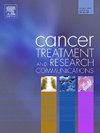Panitumumab versus cetuximab in combination with irinotecan in refractory metastatic colorectal cancer
Q3 Medicine
引用次数: 0
Abstract
Purpose
There is evidence that adding cetuximab can overcome resistance to irinotecan, but a similar analysis with Panitumumab isn't readily available. This study evaluated the activity of each anti-EGFR plus irinotecan as a salvage third-line treatment for metastatic colorectal cancer.
Methods
This is a retrospective cohort of metastatic colorectal cancer patients who progressed to irinotecan monotherapy and were exposed to an anti-EGFR antibody as a third line of treatment. This study was conducted at a single cancer center in Brazil. The primary outcome was overall survival. The secondary outcomes were objective response rate, stratified by primary tumor sidedness, progression-free survival, and toxicity.
Results
This analysis included 412 patients who had progressed on irinotecan and were KRAS wild-type. One hundred eighty-two received Irinotecan plus Cetuximab (I + C group) and 230 Irinotecan plus Panitumumab (I + P group). There was no significant difference in median overall survival between treatment groups (9.1 months [I + C] vs 10.1 months [I + P]; p = 0.76). There was also no difference in progression-free survival (3.63 months [I + C] vs 3.73 months [I + P]; p = 0.19) and objective response rate (23.0 % [I + C] vs 22.3 % [I + P]; p = 0.97). Patients with right-sided tumors had worse overall survival than left-sided (6.2 months vs 10.1 months; p = 0.003) but presented a better objective response rate with panitumumab (8.3 % [I + P] vs 3.3 % [I + C]). There were more infusion reactions with cetuximab.
Conclusions
Panitumumab and cetuximab have similar activity when combined with irinotecan as treatment for patients with disease progression with an irinotecan regimen, potentially rescuing the irinotecan activity.
帕尼单抗与西妥昔单抗联合伊立替康治疗难治性转移性结直肠癌。
目的:有证据表明添加西妥昔单抗可以克服对伊立替康的耐药,但帕尼单抗的类似分析并不容易获得。本研究评估了每一种抗egfr联合伊立替康作为转移性结直肠癌的挽救性三线治疗的活性。方法:这是一项转移性结直肠癌患者的回顾性队列研究,这些患者进展到伊立替康单药治疗,并暴露于抗egfr抗体作为第三线治疗。这项研究是在巴西的一个癌症中心进行的。主要终点是总生存期。次要结果是客观缓解率,按原发肿瘤的侧边性分层,无进展生存期和毒性。结果:该分析包括412例伊立替康治疗进展的KRAS野生型患者。伊立替康联合西妥昔单抗组(I + C组)182例,伊立替康联合帕尼单抗组(I + P组)230例。两组患者的中位总生存期无显著差异(I + C为9.1个月,I + P为10.1个月;P = 0.76)。无进展生存期也无差异(3.63个月[I + C] vs 3.73个月[I + P];p = 0.19)和客观有效率(23.0% [I + C] vs 22.3% [I + p];P = 0.97)。右侧肿瘤患者的总生存期比左侧肿瘤患者差(6.2个月vs 10.1个月;p = 0.003),但帕尼单抗的客观有效率更好(8.3% [I + p] vs 3.3% [I + C])。西妥昔单抗输注反应较多。结论:帕尼单抗和西妥昔单抗与伊立替康联合治疗疾病进展患者时具有相似的活性,有可能挽救伊立替康的活性。
本文章由计算机程序翻译,如有差异,请以英文原文为准。
求助全文
约1分钟内获得全文
求助全文
来源期刊

Cancer treatment and research communications
Medicine-Oncology
CiteScore
4.30
自引率
0.00%
发文量
148
审稿时长
56 days
期刊介绍:
Cancer Treatment and Research Communications is an international peer-reviewed publication dedicated to providing comprehensive basic, translational, and clinical oncology research. The journal is devoted to articles on detection, diagnosis, prevention, policy, and treatment of cancer and provides a global forum for the nurturing and development of future generations of oncology scientists. Cancer Treatment and Research Communications publishes comprehensive reviews and original studies describing various aspects of basic through clinical research of all tumor types. The journal also accepts clinical studies in oncology, with an emphasis on prospective early phase clinical trials. Specific areas of interest include basic, translational, and clinical research and mechanistic approaches; cancer biology; molecular carcinogenesis; genetics and genomics; stem cell and developmental biology; immunology; molecular and cellular oncology; systems biology; drug sensitivity and resistance; gene and antisense therapy; pathology, markers, and prognostic indicators; chemoprevention strategies; multimodality therapy; cancer policy; and integration of various approaches. Our mission is to be the premier source of relevant information through promoting excellence in research and facilitating the timely translation of that science to health care and clinical practice.
 求助内容:
求助内容: 应助结果提醒方式:
应助结果提醒方式:


